Since the EU referendum got under way in the UK, it has become almost an everyday occurence to turn on the TV and hear some politician explaining "I don't mean to sound racist, but..." (
example)
Of course, if you didn't mean to sound racist, you wouldn't sound racist in the first place, now would you?
The reality is, whether you like politics or not, political leaders have a significant impact on society and the
massive rise in UK hate crimes, including deaths of Polish workers, is a direct reflection of the leadership (or profound lack of it) coming down from Westminster. Maybe you don't mean to sound racist, but if this is the impact your words are having, maybe it's time to shut up?
Choosing your referendum
Why choose to have a referendum on immigration issues and not on any number of other significant topics? Why not have a referendum on nuking Mr Putin to punish him for what looks like an act of terrorism against the Malaysian Airlines flight MH17? Why not have a referendum on cutting taxes or raising speed limits, turning British motorways into freeways or an autobahn? Why choose to keep those issues in the hands of the Government, but invite the man-in-a-white-van from middle England to regurgitate Nigel Farage's fears and anxieties about migrants onto a ballot paper?
Even if David Cameron sincerely hoped and believed that the referendum would turn out otherwise, surely he must have contemplated that he was playing Russian Roulette with the future of millions of innocent people?
Let's start at the top
For those who are fortunate enough to live in parts of the world where the press provides little exposure to the antics of British royalty, an interesting fact you may have missed is that the Queen's husband,
Prince Philip, Duke of Edinburgh is actually a foreigner. He was born in Greece and has Danish and German ancestry. Migration (in both directions) is right at the heart of the UK's identity.

Home office minister Amber Rudd recently suggested British firms should
publish details about how many foreign people they employ and in which positions. She argued this is necessary to help boost funding for training local people.
If that is such a brilliant idea, why hasn't it worked for the
Premier League? It is a matter of public knowledge how many foreigners play football in England's most prestigious division, so why hasn't this caused local clubs to boost training budgets for local recruits? After all, when you consider that England hasn't won a World Cup since
1966, what have they got to lose?

All this racism, it's just not cricket. Or is it? One of the most remarkable cricketers to play for England in recent times,
Kevin Pietersen, dubbed "the most complete batsman in cricket" by The Times and "England's greatest modern batsman" by the Guardian, was born in South Africa. In the five years he was contracted to the Hampshire county team, he only played one match, because he was too busy representing England abroad. His highest position was nothing less than becoming England's team captain.
Are the British superior to every other European citizen?
One of the implications of the rhetoric coming out of London these days is that the British are superior to their neighbours, entitled to have their cake and eat it too, making foreigners queue up at Paris' Gare du Nord to board the Eurostar while British travelers should be able to walk or drive into European countries unchallenged.
This superiority complex is not uniquely British, you can observe similar delusions are rampant in many of the places where I've lived, including Australia, Switzerland and France. America's Donald Trump has taken this style of politics to a new level.
Look in the mirror Theresa May: after British 10-year old schoolboys Robert Thompson and Jon Venables abducted, tortured, murdered and mutilated
2 year old James Bulger in 1993, why not have all British schoolchildren fingerprinted and added to the police DNA database? Why should "security" only apply based on the country where people are born, their religion or skin colour?
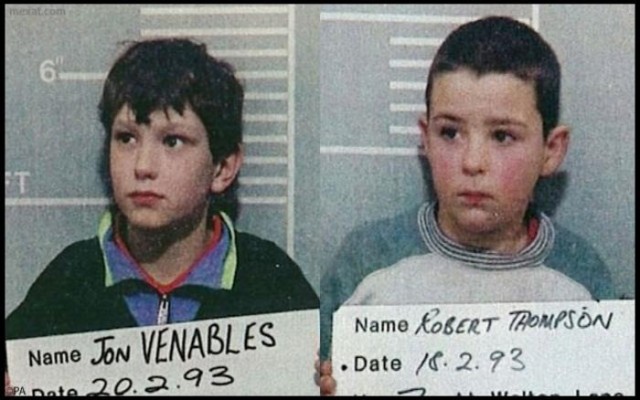
In fact, after Brexit, people like Venables and Thompson will remain in Britain while
a Dutch woman, educated at Cambridge and with two British children will not. If that isn't racism, what is?
Running foreigner's off the roads
Theresa May has only been Prime Minister for less than a year but she has a history of bullying and abusing foreigners in her previous role in the Home Office. One example of this was a policy of removing driving licenses from foreigners, which has caused administrative chaos and even taken away the licenses of many people
who technically should not have been subject to these regulations anyway.
Shouldn't the DVLA (Britain's office for driving licenses) simply focus on the competence of somebody to drive a vehicle? Bringing all these other factors into licensing creates a hostile environment full of mistakes and inconvenience at best and opportunities for low-level officials to engage in arbitrary acts of racism and discrimination.
Of course, when you are taking your country on the road to nowhere, who needs a driving license anyway?

What does "maximum control" over other human beings mean to you?
The new British PM has said she wants "
maximum control" over immigrants. What exactly does "maximum control" mean? Donald Trump appears to be promising "maximum control" over Muslims, Hitler sought "maximum control" over the Jews, hasn't the whole point of the EU been to avoid similar situations from ever arising again?
This talk of "maximum control" in British politics has grown like a weed out of the UKIP. One of their senior figures has been linked to
kidnappings and extortion, which reveals a lot about the character of the people who want to devise and administer these policies. Similar people in Australia aspire to jobs in the immigration department where they can extort money out of people for getting them pushed up the queue. It is no surprise that the first member of Australia's parliament ever sent to jail was put there for
obtaining bribes and sexual favours from immigrants. When Nigel Farage talks about copying the Australian immigration system, he is talking about
creating jobs like these for his mates.
Even if "maximum control" is important, who really believes that a bunch of bullies in Westminster should have the power to exercise that control? Is May saying that British bosses are no longer competent to make their own decisions about who to employ or that British citizens are not reliable enough to make their own decisions about who they marry and they need a helping hand from paper-pushers in the immigration department?

Echoes of the Third Reich
Most people associate acts of mass murder with the Germans who lived in the time of Adolf Hitler. These are the stories told over and and over again in movies, books and the press.
Look more closely, however, and it appears that the vast majority of Germans were not in immediate contact with the gas chambers. Even Gobels' secretary writes that
she was completely oblivious to it all. Many people were simply small cogs in a big bad machine. The clues were there, but many of them couldn't see the big picture. Even if they did get a whiff of it, many chose not to ask questions, to carry on with their comfortable lives.
Today, with mass media and the Internet, it is a lot easier for people to discover the truth if they look, but many are still reluctant to do so.
Consider, for example, the
fingerprint scanners installed in British post offices and police stations to fingerprint foreigners and criminals (as if they have something in common). If all the post office staff refused to engage in racist conduct the fingerprint scanners would be put out of service. Nonetheless, these people carry on, just doing their job, just following orders. It was through many small abuses like this, rather than mass murder on every street corner, that Hitler motivated an entire nation to serve his evil purposes.
Technology like this is introduced in small steps: first it was used for serious criminals, then anybody accused of a crime, then people from Africa and next it appears they will try and apply it to all EU citizens remaining in the UK.
How will a British man married to a French woman explain to their children that mummy has to be fingerprinted by the border guard each time they return from vacation?
The Nazis pioneered biometric technology with the tracking numbers branded onto Jews. While today's technology is electronic and digital, isn't it performing the same function?

There is no middle ground between "soft" and "hard" brexit
An important point for British citizens and foreigners in the UK to consider today is that there is no compromise between a "soft" Brexit and a "hard" Brexit. It is one or the other. Anything less (for example, a deal that is "better" for British companies and worse for EU citizens) would imply that the British are a superior species and it is impossible to imagine the EU putting their stamp on such a deal. Anybody from the EU who is trying to make a life in the UK now is playing a game of Russian Roulette - sure, everything might be fine if it morphs into "soft" Brexit, but if Theresa May has her way, at some point in your life, maybe 20 years down the track, you could be rounded up by the gestapo and thrown behind bars for a parking violation.
There has already been a five-fold increase in the detention of EU citizens in British concentration camps and
they are using grandmothers from Asian countries to refine their tactics for the efficient removal of EU citizens. One can only wonder what type of monsters Theresa May has been employing to run such inhumane operations.
This is not politics
Edmund Burke's quote "The only thing necessary for the triumph of evil is for good men to do nothing" comes to mind on a day like today. Too many people think it is just politics and they can go on with their lives and ignore it. Barely half the British population voted in the referendum. This is about human beings treating each other with dignity and respect. Anything less is abhorrent and may well come back to bite.
 Cockpit has now been in Debian unstable and
Ubuntu 17.04 and devel, which means it s now a simple
Cockpit has now been in Debian unstable and
Ubuntu 17.04 and devel, which means it s now a simple
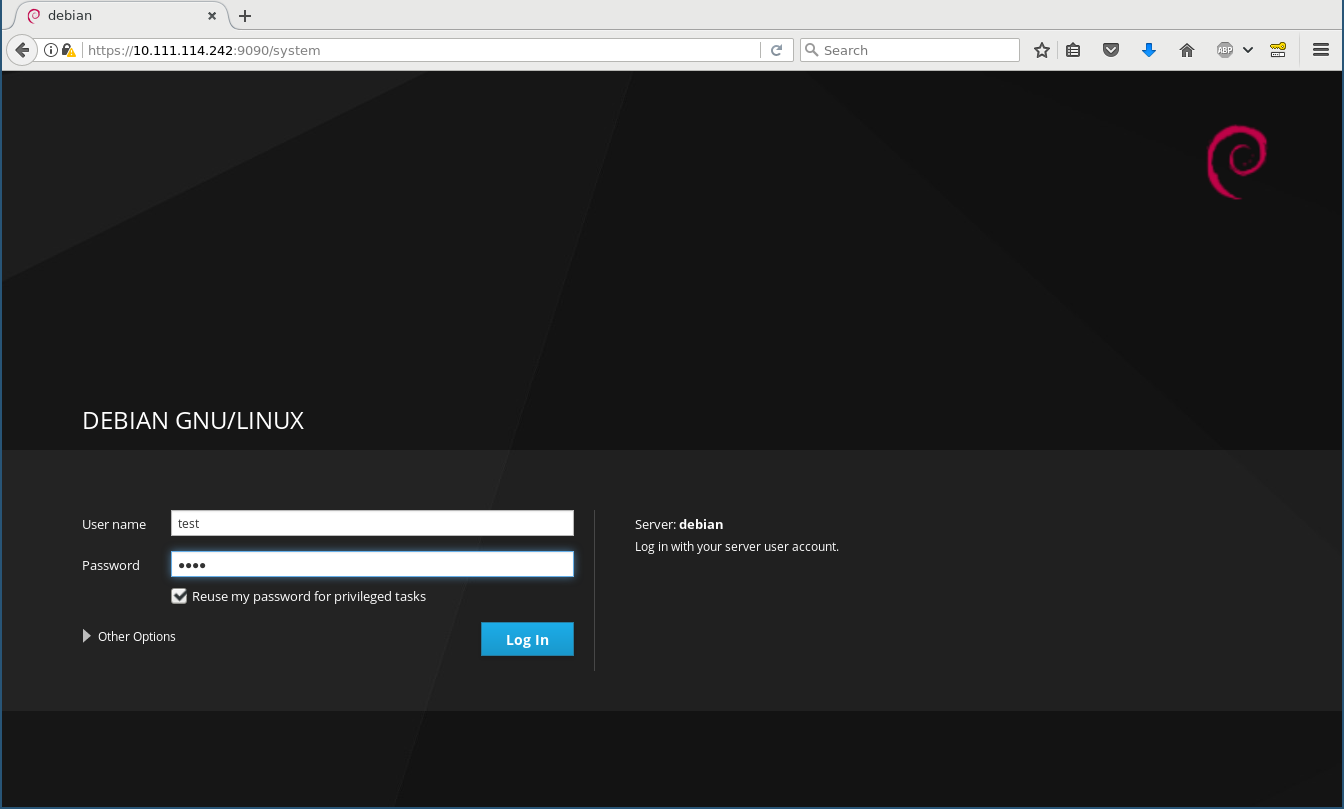
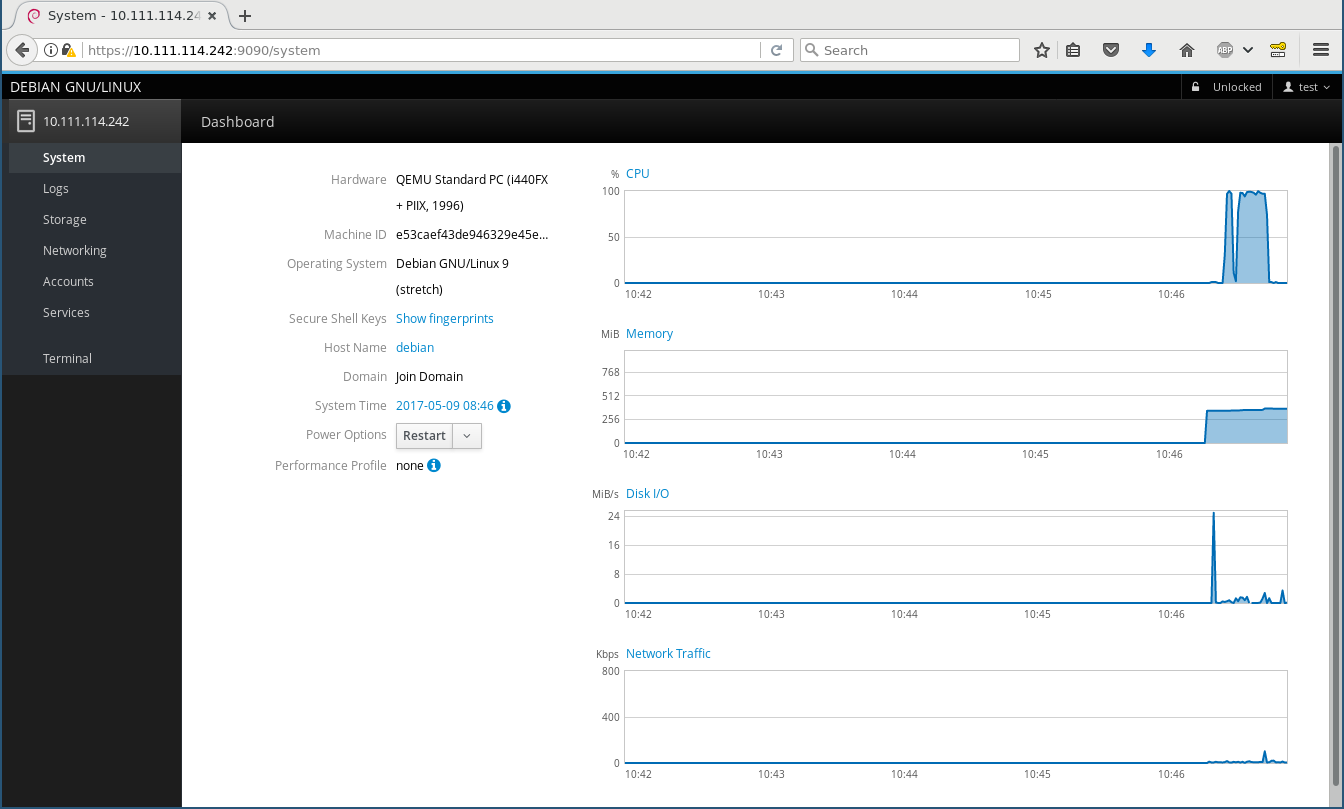 The left side bar is the equivalent of a task switcher , and the applications (i. e. modules for administering various aspects of your
server) are run in parallel.
The main idea of Cockpit is that it should not behave special in any way - it does not have any
specific configuration files or state keeping and uses the same Operating System APIs and privileges like you would on the command line
(such as
The left side bar is the equivalent of a task switcher , and the applications (i. e. modules for administering various aspects of your
server) are run in parallel.
The main idea of Cockpit is that it should not behave special in any way - it does not have any
specific configuration files or state keeping and uses the same Operating System APIs and privileges like you would on the command line
(such as 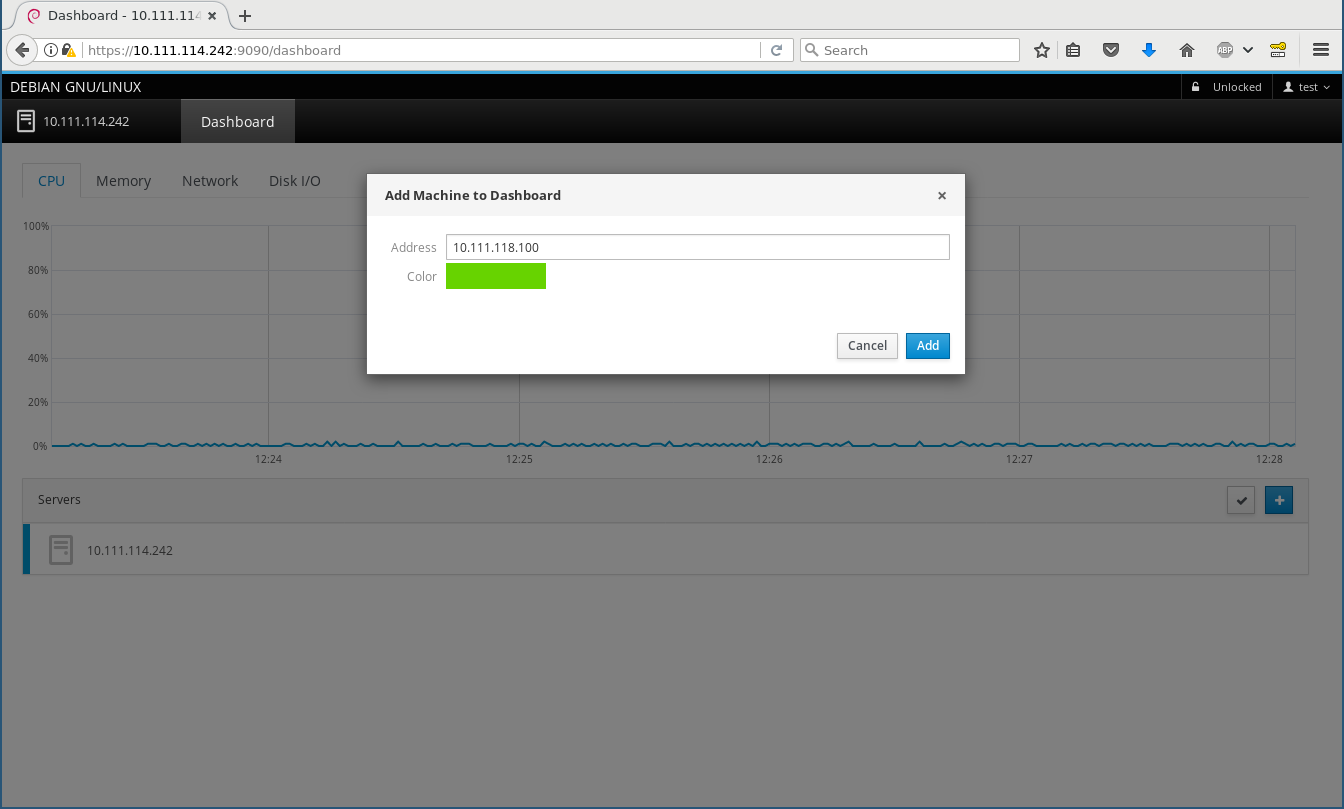
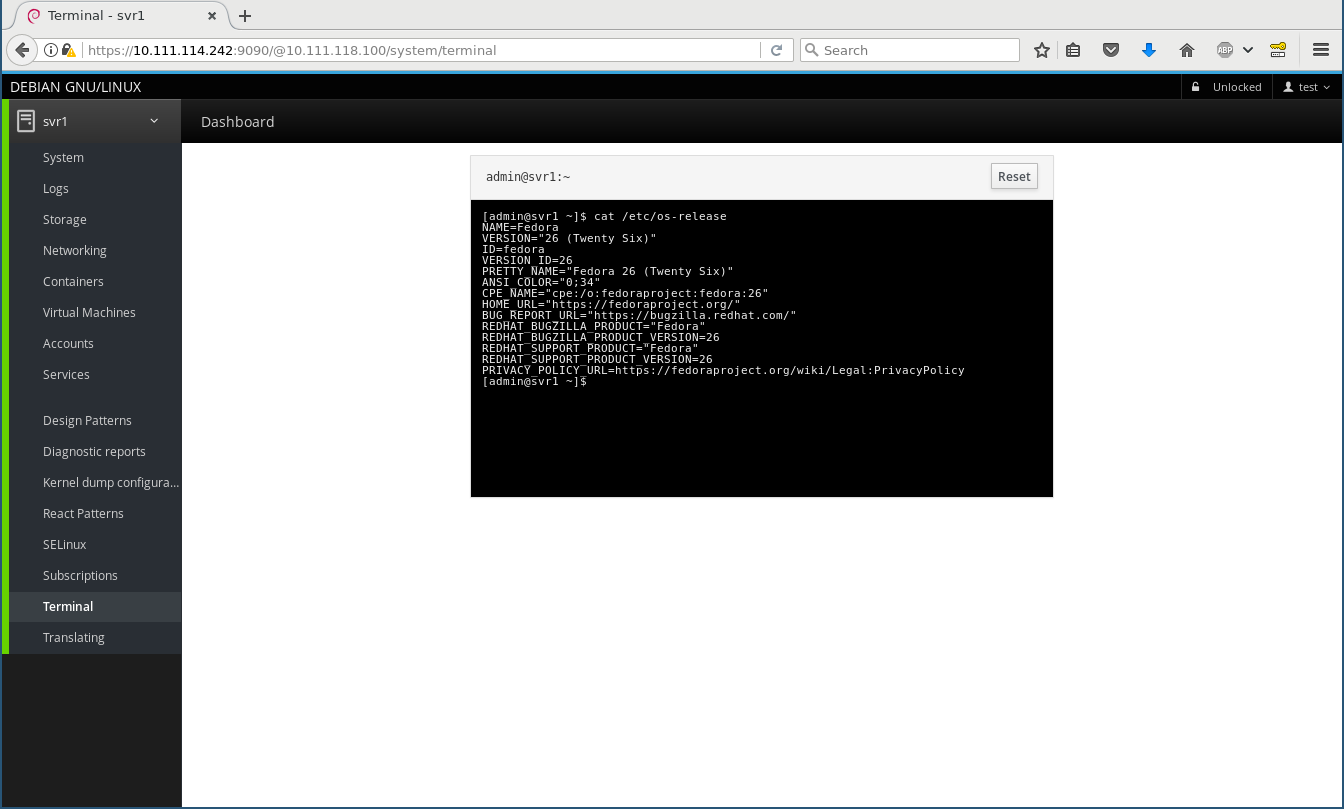 The Fedora 26 machine has some more Cockpit modules installed, including a lot of playground ones, thus you see a lot more menu entries there.
The Fedora 26 machine has some more Cockpit modules installed, including a lot of playground ones, thus you see a lot more menu entries there.

 The Fedora 26 machine has some more Cockpit modules installed, including a lot of playground ones, thus you see a lot more menu entries there.
The Fedora 26 machine has some more Cockpit modules installed, including a lot of playground ones, thus you see a lot more menu entries there.

 All this racism, it's just not cricket. Or is it? One of the most remarkable cricketers to play for England in recent times,
All this racism, it's just not cricket. Or is it? One of the most remarkable cricketers to play for England in recent times,  In fact, after Brexit, people like Venables and Thompson will remain in Britain while
In fact, after Brexit, people like Venables and Thompson will remain in Britain while  What does "maximum control" over other human beings mean to you?
The new British PM has said she wants "
What does "maximum control" over other human beings mean to you?
The new British PM has said she wants " Echoes of the Third Reich
Most people associate acts of mass murder with the Germans who lived in the time of Adolf Hitler. These are the stories told over and and over again in movies, books and the press.
Look more closely, however, and it appears that the vast majority of Germans were not in immediate contact with the gas chambers. Even Gobels' secretary writes that
Echoes of the Third Reich
Most people associate acts of mass murder with the Germans who lived in the time of Adolf Hitler. These are the stories told over and and over again in movies, books and the press.
Look more closely, however, and it appears that the vast majority of Germans were not in immediate contact with the gas chambers. Even Gobels' secretary writes that  There is no middle ground between "soft" and "hard" brexit
An important point for British citizens and foreigners in the UK to consider today is that there is no compromise between a "soft" Brexit and a "hard" Brexit. It is one or the other. Anything less (for example, a deal that is "better" for British companies and worse for EU citizens) would imply that the British are a superior species and it is impossible to imagine the EU putting their stamp on such a deal. Anybody from the EU who is trying to make a life in the UK now is playing a game of Russian Roulette - sure, everything might be fine if it morphs into "soft" Brexit, but if Theresa May has her way, at some point in your life, maybe 20 years down the track, you could be rounded up by the gestapo and thrown behind bars for a parking violation.
There is no middle ground between "soft" and "hard" brexit
An important point for British citizens and foreigners in the UK to consider today is that there is no compromise between a "soft" Brexit and a "hard" Brexit. It is one or the other. Anything less (for example, a deal that is "better" for British companies and worse for EU citizens) would imply that the British are a superior species and it is impossible to imagine the EU putting their stamp on such a deal. Anybody from the EU who is trying to make a life in the UK now is playing a game of Russian Roulette - sure, everything might be fine if it morphs into "soft" Brexit, but if Theresa May has her way, at some point in your life, maybe 20 years down the track, you could be rounded up by the gestapo and thrown behind bars for a parking violation.  I know spam is spam is spam, and I know trying to figure out any logic underneath it is a lost cause. However... I am curious.
Many spam subjects are seemingly random, designed to convey whatever "information" they contain and fool spam filters. I understand that.
Many spam subjects are time-related. As an example, in the last months there has been a surge of spam mentioning Donald Trump. I am thankful: Very easy to filter out, even before it reaches spamassassin.
Of course, spam will find thousands of ways to talk about sex; cialis/viagra sellers, escort services, and a long list of WTF.
However... Tactical flashlights. Bright enough to blind a bear.
WTF
I mean... Truly. Really. WTF
What does that mean? Why is that even a topic? Who is interested in anything like that? How often does the average person go camping in the woods? Why do we need to worry about stupid bears attacking us? Why would a bear attack me?
The list of WTF questions could go on forever. What am I missing? What does "tactical flashlight" mean that I just fail to grasp? Has this appeared in your spam?
I know spam is spam is spam, and I know trying to figure out any logic underneath it is a lost cause. However... I am curious.
Many spam subjects are seemingly random, designed to convey whatever "information" they contain and fool spam filters. I understand that.
Many spam subjects are time-related. As an example, in the last months there has been a surge of spam mentioning Donald Trump. I am thankful: Very easy to filter out, even before it reaches spamassassin.
Of course, spam will find thousands of ways to talk about sex; cialis/viagra sellers, escort services, and a long list of WTF.
However... Tactical flashlights. Bright enough to blind a bear.
WTF
I mean... Truly. Really. WTF
What does that mean? Why is that even a topic? Who is interested in anything like that? How often does the average person go camping in the woods? Why do we need to worry about stupid bears attacking us? Why would a bear attack me?
The list of WTF questions could go on forever. What am I missing? What does "tactical flashlight" mean that I just fail to grasp? Has this appeared in your spam?
 The Omen
Another classic is
The Omen
Another classic is 

 The image has been taken from
The image has been taken from  The image comes from
The image comes from 


 . Who said gluttony is bad
. Who said gluttony is bad Or this
Or this
 I don't often write on this blog, and when I do, it's either tech related,
or light life stuff.
Over the next few weeks, it's going to get a lot more political. If you
currently follow this blog for its technical content, you may be tempted to
tune out. I would encourage you to stay and listen. I'm passionate about
the technology that I work on; but the greatest problems facing our world
today are not ones that will be solved with software.
American democracy is in bad shape, and it's because of what we're doing to
it. This is not a problem of the Right or of the Left; it is not a problem
that began with the election of Donald Trump, and it's not a problem that
will go away at the end of his term. It is partly a structural problem with
the way our elections work, but more than that it's a problem of how we're
splitting into separate tribes, isolating ourselves from those who don't
agree with us.
As
I don't often write on this blog, and when I do, it's either tech related,
or light life stuff.
Over the next few weeks, it's going to get a lot more political. If you
currently follow this blog for its technical content, you may be tempted to
tune out. I would encourage you to stay and listen. I'm passionate about
the technology that I work on; but the greatest problems facing our world
today are not ones that will be solved with software.
American democracy is in bad shape, and it's because of what we're doing to
it. This is not a problem of the Right or of the Left; it is not a problem
that began with the election of Donald Trump, and it's not a problem that
will go away at the end of his term. It is partly a structural problem with
the way our elections work, but more than that it's a problem of how we're
splitting into separate tribes, isolating ourselves from those who don't
agree with us.
As  Fran ois Hollande and S gol ne Royal. Royal's brother
Fran ois Hollande and S gol ne Royal. Royal's brother 
![[Donald Trump]](http://www.braincells.com/debian/images/donaldtrump.jpg)
 A very nice new update to the
A very nice new update to the  which highlights another nice feature: the
which highlights another nice feature: the  I like Italian food and Mexican food, he said.
Where are you from? she asked.
Yemen, but I like Italian food and Mexican food, he answered.
You don't like Yemeni food? she asked.
Eh, well, it's the thing you grow up with, he replied. Do you know Yemeni food?
Yes, she said, I like .
Oh, is good if you like meat. If you like vegetables, try .
Why wouldn't I like meat? she demanded.
You know, every place in Yemen does differently. I like the way they do
it in the west of Yemen, near Africa, he said, and proceeded to describe the
cooking process.
I like Italian food and Mexican food, he said.
Where are you from? she asked.
Yemen, but I like Italian food and Mexican food, he answered.
You don't like Yemeni food? she asked.
Eh, well, it's the thing you grow up with, he replied. Do you know Yemeni food?
Yes, she said, I like .
Oh, is good if you like meat. If you like vegetables, try .
Why wouldn't I like meat? she demanded.
You know, every place in Yemen does differently. I like the way they do
it in the west of Yemen, near Africa, he said, and proceeded to describe the
cooking process.
 DebConf15 will be held in Heidelberg, Germany from the 15th to the 22nd of
August, 2015. The clock is ticking and our annual conference is approaching.
There are less than three months to go, and the Call for Proposals period
closes in only a few weeks.
This year, we are encouraging people to submit half-length 20-minute events,
to allow attendees to have a broader view of the many things that go on in the
project in the limited amount of time that we have.
To make sure that your proposal is part of the official DebConf schedule you
should submit it before June 15th.
If you have already sent your proposal, please log in to summit and make sure
to improve your description and title. This will help us fit the talks into
tracks, and devise a cohesive schedule.
For more details on how to submit a proposal see:
DebConf15 will be held in Heidelberg, Germany from the 15th to the 22nd of
August, 2015. The clock is ticking and our annual conference is approaching.
There are less than three months to go, and the Call for Proposals period
closes in only a few weeks.
This year, we are encouraging people to submit half-length 20-minute events,
to allow attendees to have a broader view of the many things that go on in the
project in the limited amount of time that we have.
To make sure that your proposal is part of the official DebConf schedule you
should submit it before June 15th.
If you have already sent your proposal, please log in to summit and make sure
to improve your description and title. This will help us fit the talks into
tracks, and devise a cohesive schedule.
For more details on how to submit a proposal see:  Since 2009, I am persuing a personal programming project.
As I am not a professional programmer, I have spent quite a lot of that
time exploring options. I have thrown out about three or four prototype
implementations already. My last implementation seems to contain enough
accumulated wisdom to be actually useful. I am far from finished, but the path
I am walking now seems relatively sound.
So, what is this project about? I have set myself a rather ambitious
goal: I am trying to implement a two-way bridge between visual music notation
and
Since 2009, I am persuing a personal programming project.
As I am not a professional programmer, I have spent quite a lot of that
time exploring options. I have thrown out about three or four prototype
implementations already. My last implementation seems to contain enough
accumulated wisdom to be actually useful. I am far from finished, but the path
I am walking now seems relatively sound.
So, what is this project about? I have set myself a rather ambitious
goal: I am trying to implement a two-way bridge between visual music notation
and  I was browsing Eric Kim s street photography blog, when I stumbled across one article about the well-known Gear Acquisition Syndrome that plagues enthusiast photographers.
Gear Acquisition Syndrome is the obsession that enthusiasts tend to have for new gear, new gadgets, new stuff, as an excuse for not developing their skills or taking action. You can recognize it by phrases like: If only I had that new gear, I would be better at what I do I can t do that project until I buy this gear My super expensive camera is not good for that, I need an even more expensive one (etc).
The article,
I was browsing Eric Kim s street photography blog, when I stumbled across one article about the well-known Gear Acquisition Syndrome that plagues enthusiast photographers.
Gear Acquisition Syndrome is the obsession that enthusiasts tend to have for new gear, new gadgets, new stuff, as an excuse for not developing their skills or taking action. You can recognize it by phrases like: If only I had that new gear, I would be better at what I do I can t do that project until I buy this gear My super expensive camera is not good for that, I need an even more expensive one (etc).
The article,